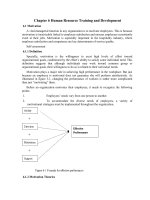Lecture management a pacific rim focus chapter 11 human resource management
Bạn đang xem bản rút gọn của tài liệu. Xem và tải ngay bản đầy đủ của tài liệu tại đây (221.8 KB, 29 trang )
CHAPTER 11
HUMAN RESOURCE
MANAGEMENT
© 2003 McGraw-Hill Australia Pty Ltd. PowerPoint
1
LECTURE OUTLINE
•
•
•
•
•
The HRM framework
Establishing the employment relationship
Maintaining the employment relationship
HRIS, Internet, intranets & extranets
Terminating the employment relationship
© 2003 McGraw-Hill Australia Pty Ltd. PowerPoint
2
The HRM framework
Those management functions concerned
with attracting, maintaining and
developing people in the employment
relationship.
© 2003 McGraw-Hill Australia Pty Ltd. PowerPoint
3
The HRM framework
HRM functions
Identifying HR needs
Attracting human resources
Maintaining human resources
Terminating the relationship
© 2003 McGraw-Hill Australia Pty Ltd. PowerPoint
4
The HRM framework
Principles of HRM
• Proactive approach, link to strategic planning
& cultural change.
• View of people as capital, not cost.
• Possibility of mutually beneficial relationship
between stakeholders.
© 2003 McGraw-Hill Australia Pty Ltd. PowerPoint
5
The HRM framework
Regulatory framework
• Australia & New Zealand, long history of
government support for union involvement.
• Since early 1990s, major shift toward enterprise or
individual agreements.
• Increasing reliance on civil law processes.
• Growth of regulation relating to human rights,
discrimination, EEO, OH&S, environmental matters.
© 2003 McGraw-Hill Australia Pty Ltd. PowerPoint
6
Establishing the employment
relationship
•
•
•
•
•
Human resource planning
Job analysis
Recruitment
Selection
Interviews
© 2003 McGraw-Hill Australia Pty Ltd. PowerPoint
7
Establishing the employment
relationship
Human resource planning
Determining future human resource needs in
relation to an organisation’s business
objectives or strategic plan.
© 2003 McGraw-Hill Australia Pty Ltd. PowerPoint
8
Establishing the employment
relationship
Job analysis
The systematic collecting and recording of
information about the purpose of a job, its major
duties, the conditions under which it is performed,
the required contacts with others and the
knowledge, skills and abilities needed to perform
it effectively.
© 2003 McGraw-Hill Australia Pty Ltd. PowerPoint
9
Establishing the employment
relationship
Job analysis
– Outcomes:
• Job descriptions and job specifications.
– Impacts upon:
•
•
•
•
•
Recruitment & selection
Performance appraisal
Remuneration
Training & development
Job design & redesign.
© 2003 McGraw-Hill Australia Pty Ltd. PowerPoint
10
Establishing the employment
relationship
Job analysis-methods
•
•
•
•
•
•
For existing jobs, interviews with employees.
Interviews with supervisors.
Observation.
Combination, interviews & observation.
Structured questionnaires.
Employee journals/logbooks.
© 2003 McGraw-Hill Australia Pty Ltd. PowerPoint
11
Establishing the employment
relationship
Recruitment
‘The process of finding and attracting job candidates
capable of effectively filling job vacancies.’ (Wether
& David, Schuler & Huber.)
© 2003 McGraw-Hill Australia Pty Ltd. PowerPoint
12
Recruitment
33 Objectives
Objectives
Ensuring
Ensuring
compliance
compliance
by
byorganisation
organisation
with
withgovernment
government
Regulations.
Regulations.
Maximising
Maximisingthe
the
pool
pool of
ofapplicants
applicants
at
atminimum
minimumcost.
cost.
Attracting
Attractingsuitably
suitably
qualified
qualified&&
skilled
skilledapplicants.
applicants.
© 2003 McGraw-Hill Australia Pty Ltd. PowerPoint
13
Establishing the employment relationship
Methods of recruitment
Internal
Internalpromotion
promotion
Executive
Executiverecruitment
recruitment
(‘head
(‘head hunters’)
hunters’)
Advertisements
Advertisements
Campus
Campusinterviews
interviews
Employee
Employeereferrals
referrals
Contractors
Contractors
Employment
Employment
agencies
agencies
Internet
Internet job
job
&&career
careersites
sites
© 2003 McGraw-Hill Australia Pty Ltd. PowerPoint
14
Establishing the employment
relationship
Selection process:
The decision-making system used to identify which
job applicants are best suited to the vacant position.
Key aspects:
– Reliability
– Validity
– Selection devices.
© 2003 McGraw-Hill Australia Pty Ltd. PowerPoint
15
Establishing the employment
relationship
Key aspects of selection:
Reliability
The degree to which the
decision making process
will measure the same
Consistently.
Selection devices
• Application form
• Written tests
• Selection interview
• Assessment centre
Validity
Whether the decision
process actually measures
what it sets out to measure.
© 2003 McGraw-Hill Australia Pty Ltd. PowerPoint
16
Maintaining the relationship
• Remuneration
The financial payment to employees for their work.
• Training
The process of equipping people with skills and
competencies.
• Development
Broad preparation employee for future opportunities
through the acquisition of new knowledge, skills.
• Performance appraisal
Judgemental assessment of employee performance.
© 2003 McGraw-Hill Australia Pty Ltd. PowerPoint
17
Maintaining the relationship
Remuneration & benefits:
• Linked to job analysis
• Governed by regulatory framework
• Internal pay equity
• External pay equity
© 2003 McGraw-Hill Australia Pty Ltd. PowerPoint
18
Maintaining the relationship
Training & development:
Choices:
– Buy skills, build them, or a mixed approach.
Strategic rationales for training:
– Proactive
– Reactive
– Enhancement of employee motivation,
commitment & retention.
© 2003 McGraw-Hill Australia Pty Ltd. PowerPoint
19
Maintaining the relationship
PERFORMANCE APPRAISALS
MOULD EMPLOYEE
BEHAVIOUR TO
COMPANY NORMS
IMPROVE QUALITY
OF SALARY REVIEWS
BUILD CONSISTENCY OF
EMPLOYEE ACTIONS &
ORGANISATION GOALS
IMPROVE HR PLANNING
TRAINING & SUCCESSION
PROVIDE RECORD FOR DISMISSAL,
DEMOTION, GRIEVANCE, APPEAL
© 2003 McGraw-Hill Australia Pty Ltd. PowerPoint
20
Maintaining the relationship
Performance
Performance
appraisal
appraisal
o
360
360o feedback
feedback —
—
non-hierarchical
non-hierarchical method
method
© 2003 McGraw-Hill Australia Pty Ltd. PowerPoint
21
HRIS, Internet, Intranets &
Extranets
• HRIS
Human Resource Information System.
• Internet
Global connection of computer servers through which users
can access stored information from their PCs.
• Intranets
Closed networks of information databases & systems within
an organisation.
• Extranets
Closed networks of information systems between
organisations.
© 2003 McGraw-Hill Australia Pty Ltd. PowerPoint
22
HRIS, Internet, Intranets &
Extranets
Enhanced distribution
of HR policy,
news, information
Better internal
communication
Widespread
electronic
systems
Employee maintenance
of own HR records
Multi-site collaborative
work teams, electronically
linked
Performance appraisal,
including 360O feedback
© 2003 McGraw-Hill Australia Pty Ltd. PowerPoint
23
The future of work
•
•
•
•
•
Fewer core employees
Increased part-time, casual & temporary staff
Tele-working
Hot-desking
Temporary agency work, short-term labour
hires, on-call & contract workers
• Personnel supply firms
• Idea of employee as an independent contractor
© 2003 McGraw-Hill Australia Pty Ltd. PowerPoint
24
The future of work
Flexible employing organisations:
• Need for strategic, vs. cost reduction focus.
• Reliance on staffing agencies.
Flexible employees:
•
•
•
•
Self-employed.
Use of staffing agency.
Maintain skills base.
‘Portfolio’ worker.
© 2003 McGraw-Hill Australia Pty Ltd. PowerPoint
25









